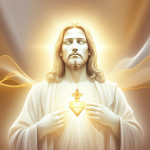Higher Education
The Meaning of Easter from a Spiritual Perspective
 Easter is typically viewed as a Christian holiday that celebrates the resurrection of Jesus Christ from the dead, as described in the New Testament of the Bible. It is considered the most important and joyful event in the Christian calendar, symbolizing hope, renewal, and the victory of life over death.
Easter is typically viewed as a Christian holiday that celebrates the resurrection of Jesus Christ from the dead, as described in the New Testament of the Bible. It is considered the most important and joyful event in the Christian calendar, symbolizing hope, renewal, and the victory of life over death.
However, Easter’s much deeper spiritual meaning provides conscious clarity that transcends the limited perspective of only one religion’s viewpoint.
The Spiritual Meaning of Easter: Renewal, Hope, and Togetherness
Easter is a time of profound meaning and celebration, embodying renewal, hope, and connection themes. It represents a spiritual awakening, an opportunity to reflect on new beginnings, and a reminder of the beauty of transformation. Whether you observe it through religious traditions like Christ Consciousness or as a celebration of spring’s arrival, Easter holds a special place in the hearts of many.
The Significance of Easter
At its core, Easter signifies the triumph of light over darkness, life over death, and hope over despair. For Christians, it marks the resurrection of Jesus into the Christ Consciousness, symbolizing faith and eternal life. Beyond its spiritual essence, Easter is also a celebration of the changing seasons, as nature awakens after the dormancy of winter.
This season resonates with a universal message of renewal. It gently asks us to pause, shed old layers, and allow ourselves to grow into something brighter and better. It encourages us to nurture our inner light and connect more deeply with our Highest Self and one another through the unity of Oneness.
October 19 2023 – Conscious Clarity Center Satsang Meditation
Welcome to the Conscious Clarity Center Satsang Meditation Group
The Conscious Clarity Center, Satsang Meditation Group, meets on the Third-Thursday of each month. It discusses “How to Embrace Spirituality in Daily Life” through the process of Spiritual Transformative Education. This event is for anyone who wants to learn how to maintain inner peace and participate in a Spiritual Body experience.
Join the ongoing discussion every Third-Thursday of the month.
Sign up for our Newsletter for the location and reminders for this monthly event!
